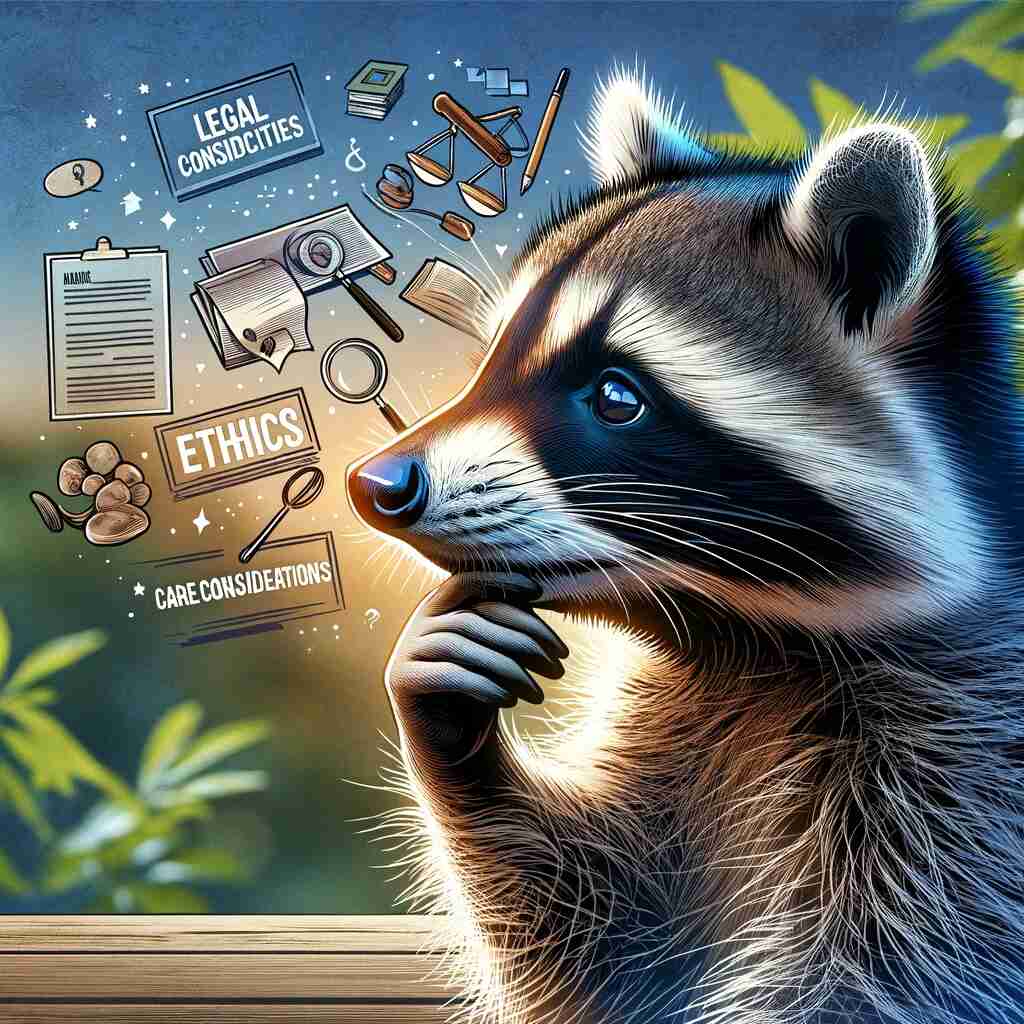Owning a raccoon as a pet is a complex and challenging topic with various legal, ethical, and practical considerations. Here’s an extensive exploration of where you can own a raccoon, the laws governing such ownership, the responsibilities involved, and the implications of having a raccoon as a pet.
1. Legal Considerations
Raccoon ownership laws vary significantly by country, state, and even city. Here’s a breakdown:
United States:
- Legal States: Some states like Oklahoma, Wisconsin, and Texas might allow raccoon ownership with specific permits.
- Illegal States: In many states, including California and Alaska, it’s illegal to own a raccoon due to their status as wild animals and potential rabies vectors.
- Permit Requirements: States that do allow ownership often require a wildlife permit. These permits might mandate health checks and proof of a safe, escape-proof enclosure.
Canada:
- Provincial Regulations: Canadian provinces have their regulations. For instance, British Columbia generally prohibits keeping wildlife without a permit, which is rarely granted for raccoons.
Europe:
- Country-Specific Laws: European countries have varying laws. In the UK, for example, you can own a raccoon, but you need to comply with the Dangerous Wild Animals Act and local bylaws.
2. Ethical Considerations
Even in places where it’s legal, ethical considerations are paramount:
- Wild vs. Domestic: Raccoons are wild animals, not domesticated pets. They have specific environmental, dietary, and behavioral needs that are difficult to meet in a home setting.
- Human Imprint: Raccoons raised by humans may never learn to fend for themselves, making them unsuitable for release into the wild.
- Longevity and Commitment: Raccoons can live up to 20 years in captivity, requiring a long-term commitment from any owner.
3. Practical Considerations
Raccoons are not easy pets:
- Destructive Behavior: Raccoons are naturally curious and have dexterous hands, leading them to tear apart furnishings, climb curtains, and generally cause havoc.
- Dietary Needs: They require a varied diet and proper nutrition, which can be hard to provide.
- Healthcare: Veterinary care for raccoons can be challenging to find and expensive, as few vets are trained in their care.
4. Alternatives to Ownership
Instead of owning a raccoon, consider these alternatives:
- Wildlife Rehabilitation: Volunteer with wildlife rehabilitation centers where you can care for raccoons and other wildlife.
- Education: Educate yourself and others about raccoons and their role in the ecosystem, promoting coexistence and understanding.
- Support Conservation: Support or engage in conservation efforts that protect raccoon habitats.
5. The Way Forward
If you’re set on owning a raccoon, proceed with caution:
- Research: Thoroughly research your local laws and find a vet willing and able to treat raccoons.
- Consider the Full Impact: Reflect deeply on the ethical and practical implications of owning a raccoon.
- Prepare for Challenges: Be prepared for the significant challenges and long-term commitment involved.
FAQs
Q: Can I own a raccoon if I have a permit?
A: In some jurisdictions, yes, but permits often come with stringent requirements and are sometimes only granted to educational or rehabilitation facilities.
Q: Are raccoons dangerous as pets?
A: Raccoons can be unpredictable and may bite or scratch, especially if they feel threatened. They also carry zoonotic diseases, like rabies.
Q: How much does it cost to keep a raccoon?
A: Costs vary widely but expect significant expenses for proper housing, food, and veterinary care.
Q: Can I train a raccoon like a dog or cat?
A: Raccoons can learn some commands and tricks, but they retain wild instincts and behaviors that make them challenging and unpredictable pets.
Q: What should I do if I find an orphaned raccoon?
A: Contact local wildlife authorities or a licensed wildlife rehabilitator. Do not try to care for it yourself.
Final Thoughts
While the idea of a raccoon as a pet might seem intriguing, the reality is often far from ideal. Understanding and respecting the nature of these wild animals, along with adhering to legal guidelines, is crucial. For those still interested, thorough research and preparation are imperative to ensure the well-being of the animal and the owner.
Owning a raccoon is fraught with challenges and often prohibited by law. It’s vital to consider the ethical implications and practical realities of taking a wild animal into your home. For most people, engaging in conservation efforts or supporting wildlife rehabilitation offers a more ethical and practical way to enjoy and protect these fascinating creatures.










